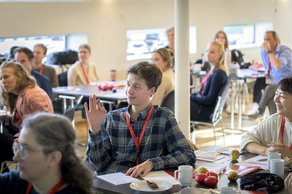Young talents get stepping stone to good research management
A new generation of researchers in cardiovascular disease have taken the first step towards becoming good leaders. With the course Empower Your Talent, they have begun training as good research leaders. During the intense two-day course, the young talents focused on vulnerability, motivation and their personal leadership style.




“A lot of young researchers are surprised to learn that the job comes with management responsibility. They are suddenly responsible for attracting funding, putting together a team and launching and heading a research project. It is a huge responsibility, and if you want your research to be a success, you need to be a good leader,” concluded Peter Bregendahl, who has 13 years’ experience of teaching management to researchers.
Some of the most talented PhD students and postdocs in cardiovascular disease in the country met at DGI-byen on 10 and 11 November 2022 to focus on management. The course was organised by the Danish Cardiovascular Academy (DCA) and facilitated by i.a. Management and Organisational Consultant Peter Bregendahl, the University of Copenhagen and Co-Founder of Ledelseshøjskolen Troels Bech, who has also coached several Danish football clubs.
Find yourself – and your identity as a leader
Peter Bregendahl began by discussing the idea that your identity as a leader is a social construct shaped both from within and by your surroundings, and the nearly 30 participants set to work enthusiastically. Peter Bregendahl and Troels Bech then introduced the concept of the authentic leader. New leaders first need to find their identity – and be true to that identity in everything they say and do, they argued.
“You need to pay attention to your own motivation. If it drops, it may be because you are chasing someone else’s dream,” said Troels Bech.
Authentic leaders can be vulnerable too
But is not everyone true to themselves? On reflection, and provoked by Troels Bech, most of us are likely to admit that we have at some point said something we did not really mean. Troels Bech asked the participants how many of them liked new challenges? A show of hands suggested that most of them did. But when they realised that the challenge consisted in joining Troels Bech on the stage for a dialogue, hands went down and the participants lost heart. The point of this exercise was to demonstrate that all leaders must know themselves and be true to their own values and their own approach and appearance in order to be authentic.
But that is not necessarily as easy as it sounds. During walk-and-talks and in group discussions, the participants sought to identify the main challenges of management and ways of dealing with them.
One of the participants, Sabrina Bech Mathiesen, who holds a postdoc position at the University of Southern Denmark funded by the DCA, has only just begun to express what it means to be a leader:
“Learning about different leadership styles is new to me. But it is clearly important that I get input on how to describe the different layers and elements of leadership, as this is the only way I will be able to reflect on what it means to be a leader and how I can grow as a leader. To change something, you first need to understand it. And so, understanding the concept of leadership is the first step,” said Sabrina Bech Mathiesen.
The art of heading a team of anything from prima donnas to pragmatists
Helle Hein’s four archetypes can help us reflect on the types of leaders we are at work. Helle Hein is the author of the book Primadonnaledelse (in English: Prima Donna Management), where she describes four archetypes in management: the prima donna, the introvert performance addict, the extrovert performance addict and the pragmatist (see the list below).
Troels Bech advised the participants to keep asking themselves: What is my motivation? And to encourage their colleagues to do the same. Because your motivation may change and not necessarily in the same direction.
Emotional intelligence is a precondition for becoming a good leader
The course thus sought to identify the personal competences a leader should have, and so did the internationally acclaimed psychologist Daniel Goleman in the 1990s. He looked at technical skills, cognitive capacities and emotional intelligence, and his studies showed that emotional and thus social intelligence are extremely important if you wish to create a positive working environment.
Good management is mainly found in smaller groups
In addition to the theorists’ way of explaining management, Peter Bregendahl drew on his long-held experience with university management and added that good management is typically found in smaller groups. Because in a small group, your immediate superior is always just around the corner and understands your work. According to Peter Bregendahl:
There is such a thing as a managerial span of 20 individuals – that is, the maximum number of employees a person is able to manage.
If you exceed that limit, getting processes to work can be difficult, and this will affect your work and research results. “If you want good results, the team must be headed by the individual assistant professor, associate professor or professor, and to be able to do so they will need training,” Peter Bregendahl concluded.
Helle Hein’s four archetypes in management
- The prima donna: They consider their work a ’calling’, and they feel they have a duty to make a difference for someone or something. They are always looking for like-minded people. They are not anti-social, but do not like to be forced to participate in social activities.
- The introvert performance addict: They consider their work a ’search’, and they are driven by a wish to improve their own performance, which means they are competing against themselves. They get a kick from cracking tough nuts, and they enjoy immersing themselves in their work.
- The extrovert performance addict: They consider their work a competition, and they get a kick from competing against and comparing themselves to others. They are driven by a wish to perform better than others. Their surroundings need to acknowledge their performance.
- The pragmatist: Going to work and doing a good job gives them meaning. They work when they are at work, not when they are at home.